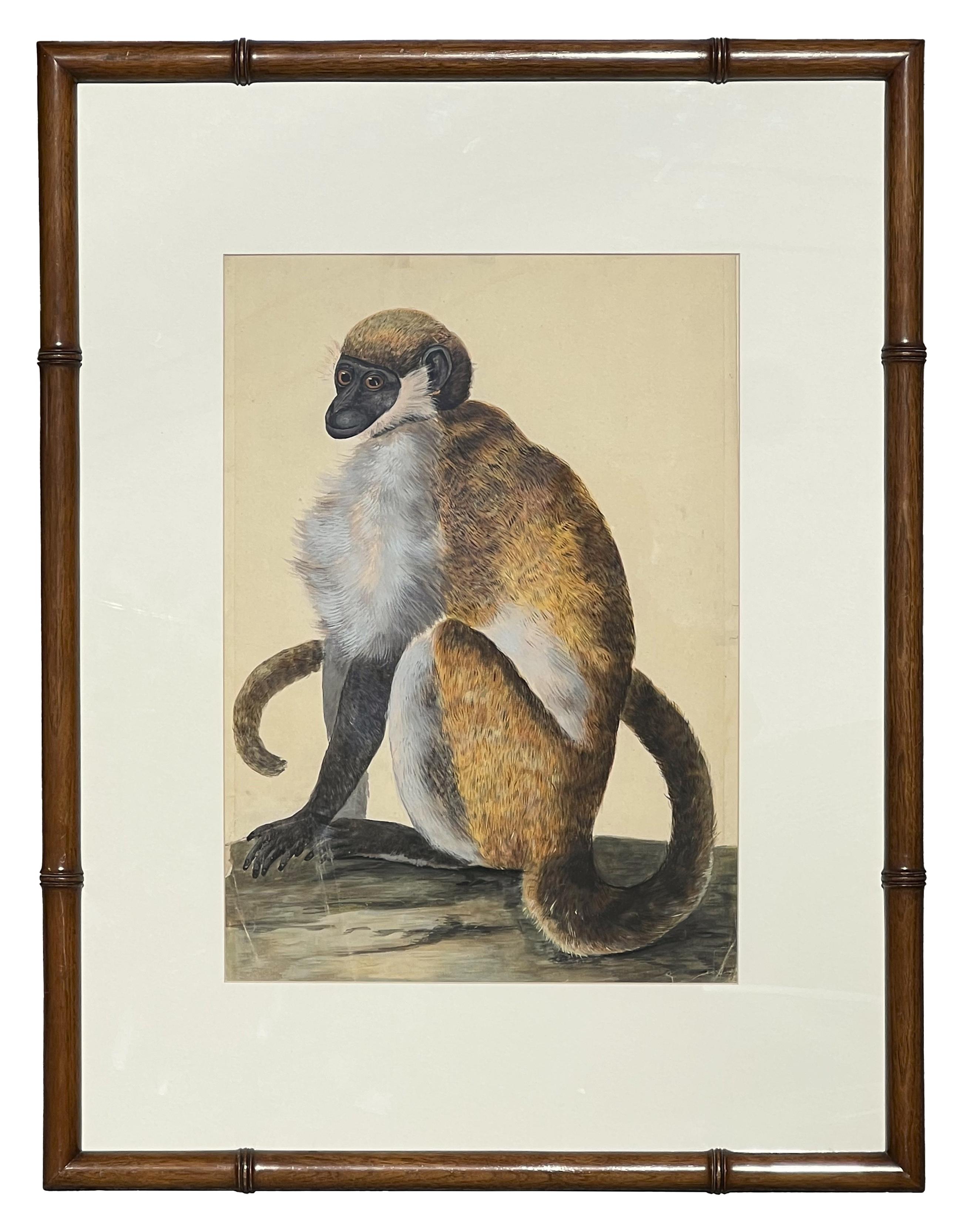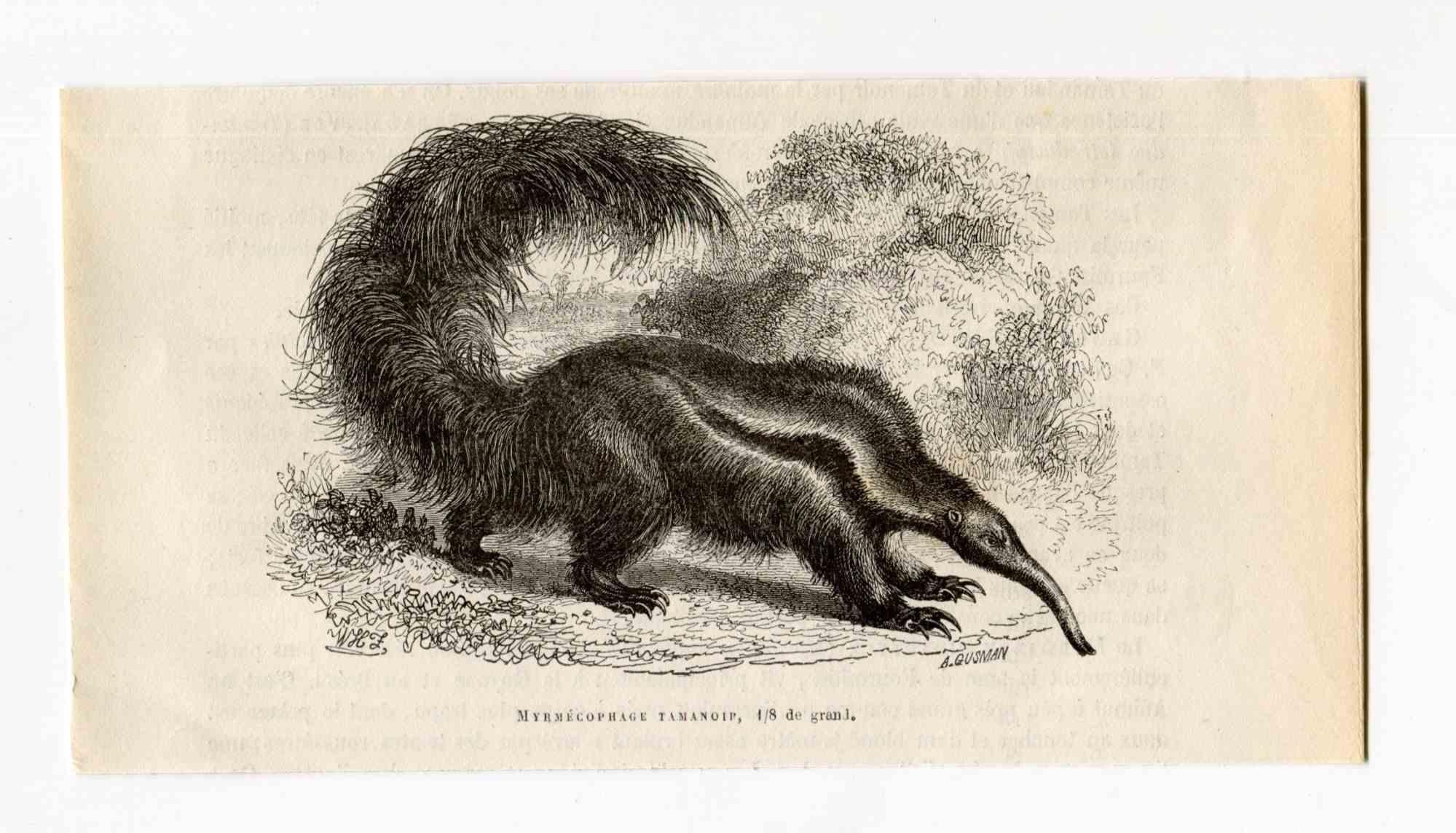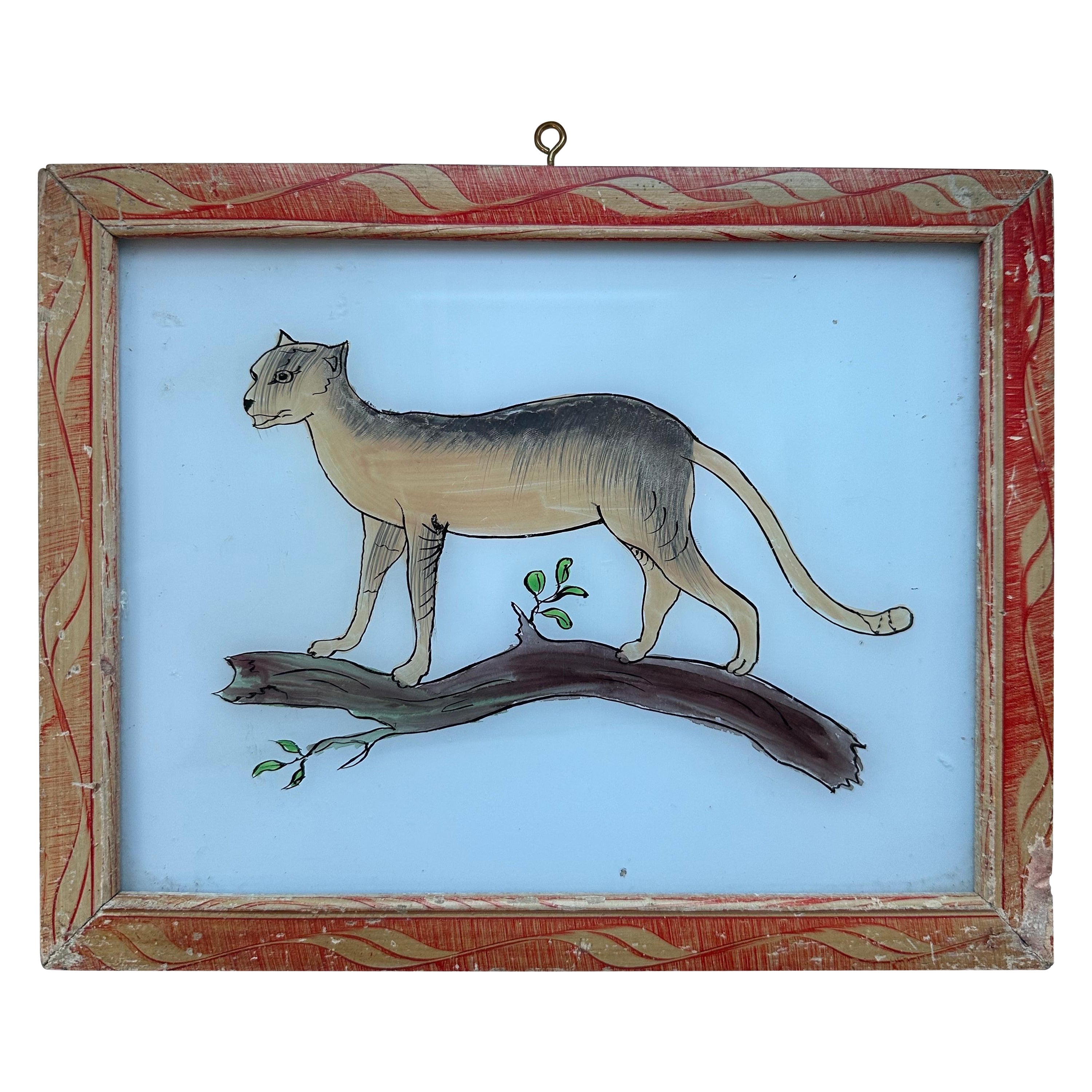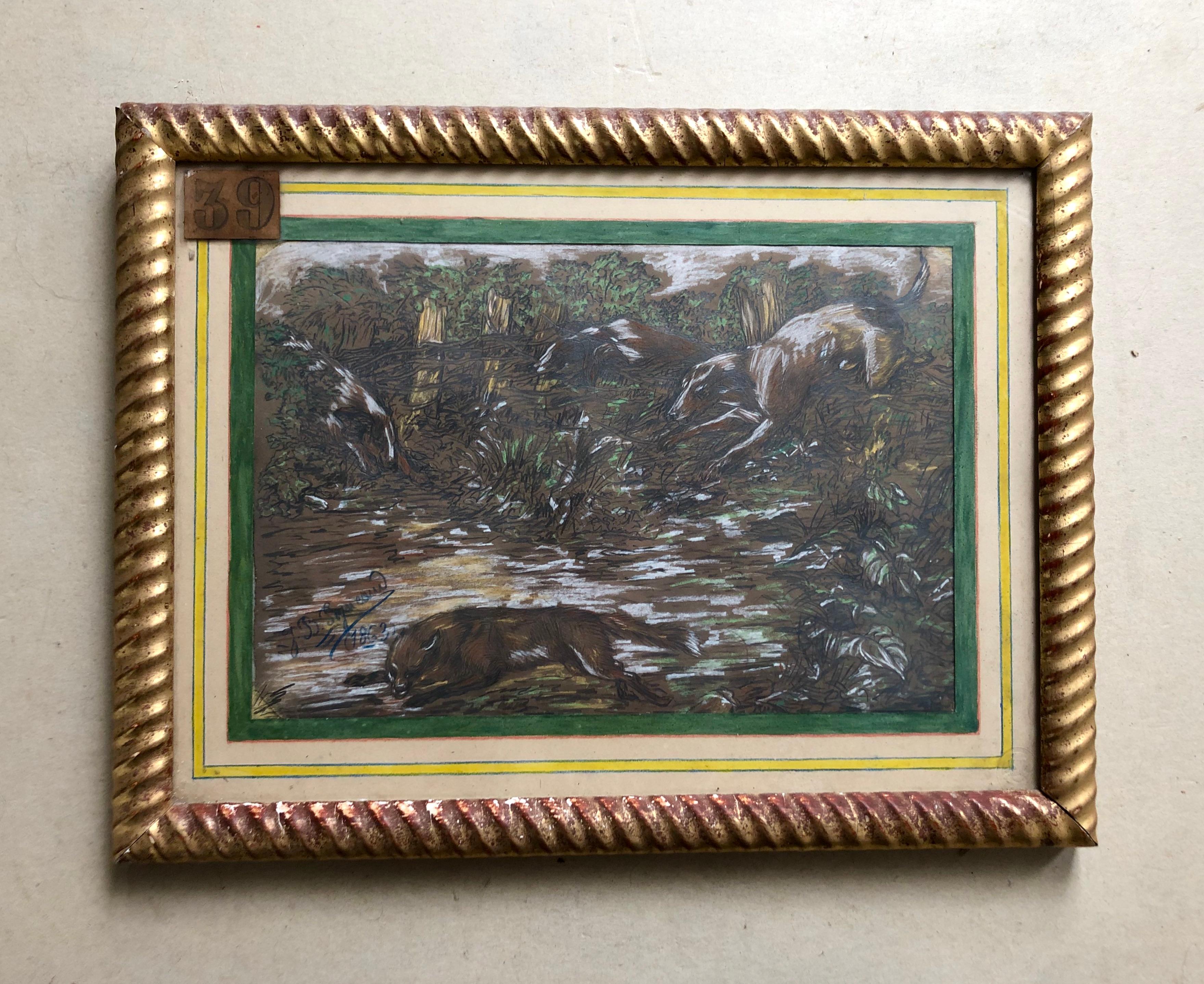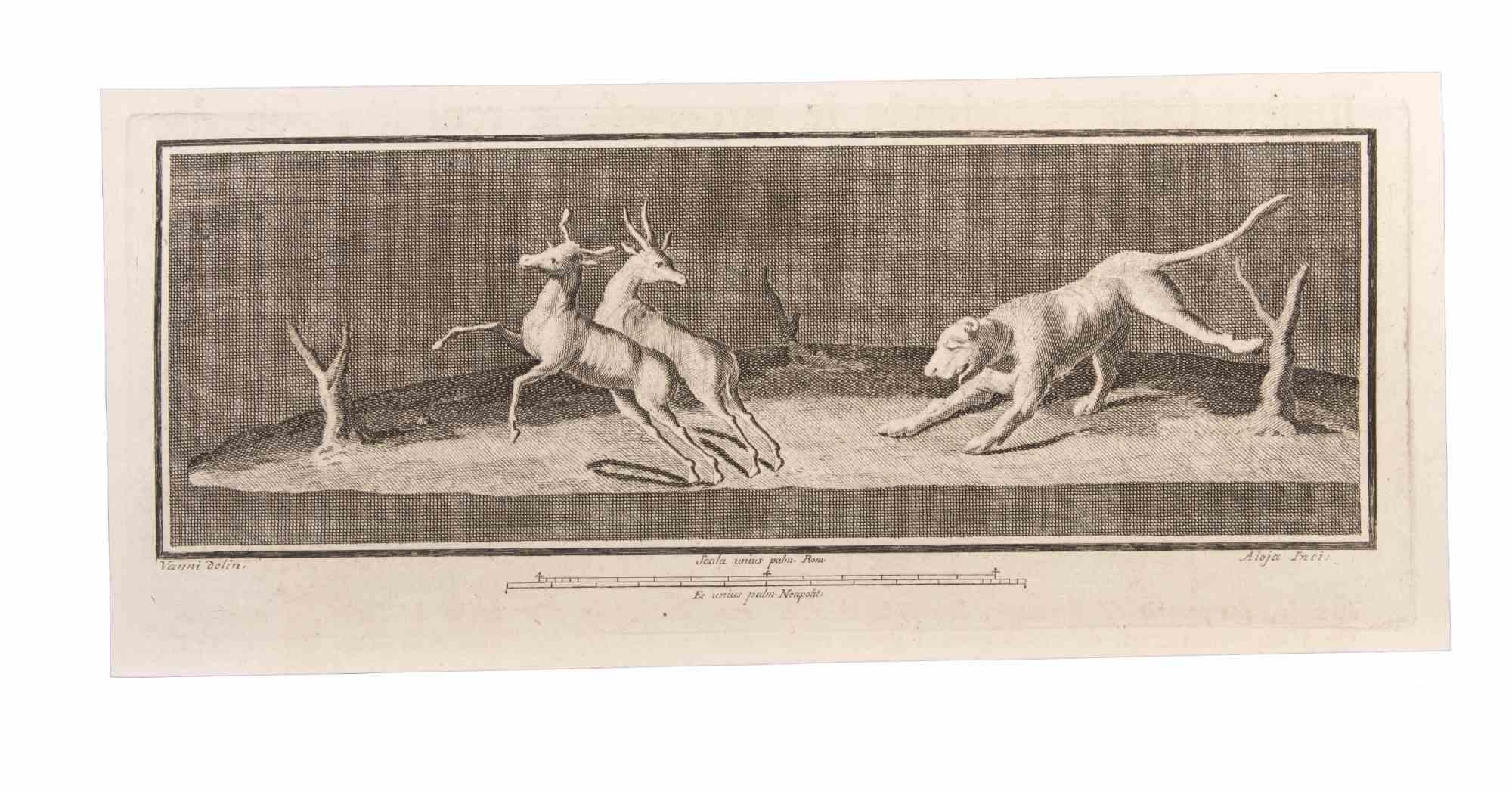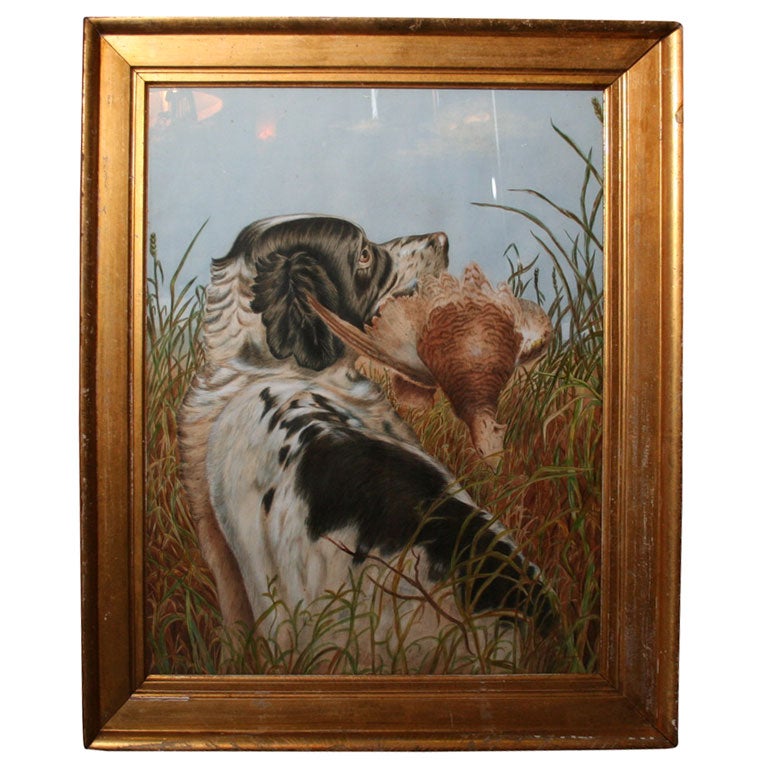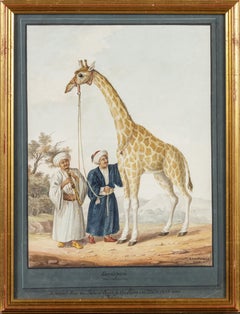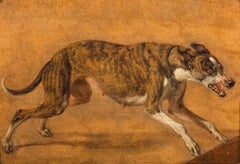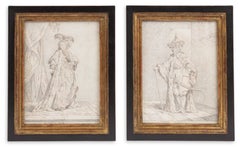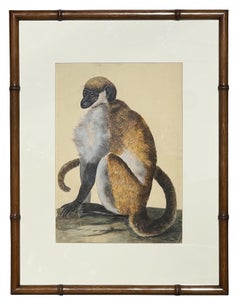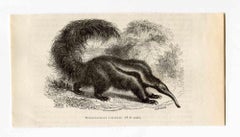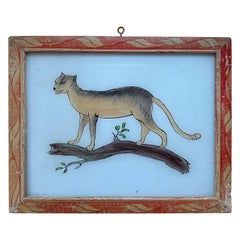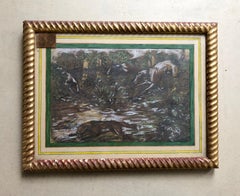Items Similar to Animal painting of a 'Tamanuâguacû (Ant-eater)' late 17th/18th century, Brazil
Want more images or videos?
Request additional images or videos from the seller
1 of 7
Animal painting of a 'Tamanuâguacû (Ant-eater)' late 17th/18th century, Brazil17th/18th century
17th/18th century
$14,741.35
£11,034.27
€12,500
CA$20,288.30
A$22,613.42
CHF 11,864.49
MX$276,146.76
NOK 150,230.20
SEK 141,990.39
DKK 95,158.80
About the Item
Follower of Zacharias Wagener (1614-1688)
Tamanuâguasû (Giant Anteater)
On Italian 17th or 18th-century paper, H. 28 x W. 43.5 cm
The present painting is a copy after Wagener’s painting of the anteater, Tamanduá-bandeira, which is illustrated in his “Thier Buch”, with 109 drawings of Brazilian fish, birds and mammals, published in Amsterdam c. 1641, in German.
Zacharias Wagener, or Wagenaer in Dutch, (Dresden 1614 – Amsterdam 1668) was a real adventurer who became Opperhoofd on Deshima and Governor of the Cape of Good Hope in the service of the VOC. During the Thirty-Year War in Germany Wagener tried his luck in Amsterdam where he worked for the map-maker Willem Blaeu. In 1634 he joined the WIC and left for Dutch Brazil where he worked as writer and painter, together with Frans Post, Willem Piso, Georg Marcgraf and Albert Eckhout to describe and depict Brazil for Governor Johan Maurits van Nassau Siegen. Wagener was the author of “Thier Buch,” with descriptions and drawings of fish, birds, animals, worms, fruits, etc. of Brazil, which were unknown in Europe.
In 1641 Wagener was back in Amsterdam where he signed up for the VOC and sailed for Batavia (Jakarta) in September 1642. There he quickly made a successful career, moving along with the highest circles. In 1656 he was appointed Opperhoofd in Japan where he made the court journey to Edo, and where he was caught in a great fire that destroyed most of the city, including the shogun’s palace. After a year he travelled back to Batavia (Jakarta), by way of Dutch Formosa/Taiwan. In 1658 Governor-General Joan Maetsuycker sent him to Japan for a second year as Opperhoofd. Because of the civil war in China between the Ming and the Qing no more ceramics were coming out of China and Wagener was the first to order ceramics in Japan, using German stonewares as examples. Back in Batavia (Jakarta) he was appointed surveyor, but because of health problems, in 1662, he was sent to the Cape of Good Hope as the successor of Jan van Riebeeck where he built the Castle of Good Hope.
Wagener kept a diary which was posthumously published in 1704, and in 1732 translated in English as “A short account of the voyages of Mr. Zachary Wagener, performed in thirty years, through Europe, Asia, Africa and America.”
- Creation Year:17th/18th century
- Dimensions:Height: 10.83 in (27.5 cm)Width: 17.13 in (43.5 cm)Depth: 0.04 in (1 mm)
- Medium:
- Movement & Style:
- After:Zacharias Wagener (1614 - 1688, Dutch, German)
- Period:
- Framing:Frame IncludedFraming Options Available
- Condition:Some foxing has been restored and bleached, but overall in very good original condition.
- Gallery Location:Amsterdam, NL
- Reference Number:1stDibs: LU147128030772
About the Seller
No Reviews Yet
Vetted Professional Seller
Every seller passes strict standards for authenticity and reliability
1stDibs seller since 2021
- ShippingRetrieving quote...Shipping from: Amsterdam, Netherlands
- Return Policy
Authenticity Guarantee
In the unlikely event there’s an issue with an item’s authenticity, contact us within 1 year for a full refund. DetailsMoney-Back Guarantee
If your item is not as described, is damaged in transit, or does not arrive, contact us within 7 days for a full refund. Details24-Hour Cancellation
You have a 24-hour grace period in which to reconsider your purchase, with no questions asked.Vetted Professional Sellers
Our world-class sellers must adhere to strict standards for service and quality, maintaining the integrity of our listings.Price-Match Guarantee
If you find that a seller listed the same item for a lower price elsewhere, we’ll match it.Trusted Global Delivery
Our best-in-class carrier network provides specialized shipping options worldwide, including custom delivery.More From This Seller
View AllThe King's Camelopard
Located in Amsterdam, NL
Charles Frederick de Brocktorff (1775–1850)
‘Camelopard – a present from the Pacha of Egypt to the King – at Malta on its way to England’
Signed and dated C.F. de Brocktorff. / 1827. lower right, inscribed as titled in the painted margins lower centre. Pencil and watercolour heightened with gold paint and gum arabic on paper, 36.8 x 27.9 cm
A gift so majestic, it made kings blush, and a gift so grand, it would startle Europe into a craze. Pasha Muhammad Ali of Egypt (1805-1848) did it in 1827: he sent to Europe three magical spotted, horned creatures, each with a neck reaching the skies and legs as long as a house is high. One giraffe to King Charles X of France, one to Francis I of Austria and the most fabled one to King George IV of England. A curious sight for Europeans, who had not seen such a beast since the Medici giraffe in 1487.
Few animals created more of a stir in Europe than these royal...
Category
1820s Naturalistic Animal Drawings and Watercolors
Materials
Gold
Study of a dog
Located in Amsterdam, NL
Study of a dog
Oil on paper laid down on panel, 17.5 x 25.5 cm
Provenance
Private collection, the Netherlands
Note:
We are grateful to Mr Fred Meijer for his attribution to Ludolf de Jongh
Ludolf de Jongh was the son of a shoemaker. When his father moved to Rotterdam, the young Ludolf decided to learn art rather than shoemaking and became a pupil of Cornelis Saftleven. Later he studied under Anthony Palamedes in Delft and still later with Jan van Bijlert in Utrecht.
In 1635 he travelled to France with Francis Bacon. Seven years later, in 1642, he returned to the Netherlands when he heard that his mother had fallen ill. He set up a shop in Rotterdam, and his earliest signed paintings date from that year.
According to Houbraken, his travels had caused him to speak French so fluently, that his parents had to learn French in order to speak with him.
De Jongh’s work shows a strong influence from the Utrecht school of Caravaggio admirers, especially Jacob Duck...
Category
Mid-17th Century Old Masters Animal Paintings
Materials
Paper, Oil, Wood Panel
Costume drawings for ‘Ambassadeur de Siam’ and ‘La Sultana Reine’
Located in Amsterdam, NL
Joseph-Marie Vien (1716-1809)
‘Ambassadeur de Siam’ and ‘La Sultana Reine’
Both titled lower centre, the drawing of the ambassador inscribed with colours intended for the prints, e...
Category
Mid-18th Century Old Masters Figurative Drawings and Watercolors
Materials
Paper, Pencil
A pair of Indonesian Landscapes, by Charles Legrain (19th century)
Located in Amsterdam, NL
Charles Legrain, (19th century)
Two Javanese landscapes
Both signed Legrain Ch. and one dated 1857
Both oil on canvas, size: 95 x 114 cm
In rich gilt-gesso frame.
(2x).
Category
Mid-19th Century Romantic Landscape Paintings
Materials
Canvas, Oil
Incoming Rain, Bali, 1937
Located in Amsterdam, NL
Incoming rain, Den Pasar, Bali 1937
Signed with initials, dated and titled, bottom right
Black chalk and ink on paper, 42 by 46 cm
Literature:
Ernst Braches en J.F. Heijbroek, W.O...
Category
1930s Art Nouveau Landscape Drawings and Watercolors
Materials
Paper, Graphite
Beach of Kusambe, Bali 1937
Located in Amsterdam, NL
Four outrigger proa’s on the beach of Kusambe, Bali, 1937
Signed with initials, dated and described with location bottom left
Pencil and ink on paper, 29.7 x 35 cm
In ebonized frame with white mount
WILLEM OTTO WIJNAND NIEUWENKAMP
(1874-1950)
Nieuwenkamp was born on July 27th 1874 in Amsterdam. His father owned sailing ships sailing to Indonesia and hearing the stories of the returning captains evoked in the young Nieuwenkamp an obsession for distant lands and adventure. After a failed attempt by his father to have his son make a career in his business, Nieuwenkamp attended the Academy for Decorative Art in Amsterdam. However, he left within one year to go his own way.
He was an autodidact and a great experimenter with new techniques, particularly in the art of etching. Nieuwenkamp was a very focused man with the discipline of a scientist tempered by the sensitivity of an artist, a lust for adventure, a natural appreciation for ethnic arts and an enormous ambition to tread new paths.
In 1898 he visited Indonesia for the first time and on his second visit in 1903-1904 he went on to Bali and became the first foreign artist to love Bali and the Balinese with a passion. Having secured agreements with several museums in the Netherlands to obtain Balinese art and objects for their collections, Nieuwenkamp immediately started to purchase and order a wide range of ethnographic art and objects from local artists and craftsmen.
Through his drawings and books, he gave an excellent impression of Balinese art and culture at that time. Since 1854 Northern Bali was under Dutch...
Category
1930s Art Nouveau Landscape Drawings and Watercolors
Materials
Paper, India Ink, Pencil
You May Also Like
Early Naturalistic Wildlife Animal Rendering of a Possible Capuchin Monkey
By Peter Paillou
Located in Houston, TX
Early naturalistic wildlife rendering by the English artist Peter Paillou. The work features a delicately rendered depiction of a possible capuchin monke...
Category
Mid-18th Century Naturalistic Animal Drawings and Watercolors
Materials
Gouache
Myrmecophagy - Lithograph by Paul Gervais - 1854
By Paul Gervais
Located in Roma, IT
Myrmecophagy is an original lithograph on ivory-colored paper, realized by Paul Gervais (1816-1879). The artwork is from The Series of "Les Trois Règnes d...
Category
1850s Modern Animal Prints
Materials
Lithograph, Paper
19th-Century Animal Study: Exquisite Wildlife Painting
Located in Southall, GB
This remarkable 19th-century animal painting captures the essence and character of its subject with exceptional detail and artistry. The artist’s skillful use of color and texture br...
Category
Antique 19th Century English Paintings and Screens
Materials
Glass
Fox Hunting, Drawing Signed And Dated 1863
Located in SAINT-OUEN-SUR-SEINE, FR
Fox hunting.
Graphite and pastel highlights.
Drawing signed and dated 1863.
Signature to be identified.
Framed and under glass.
Old frame gilded with fine gold.
Small stucco gaps in ...
Category
1860s Animal Drawings and Watercolors
Materials
Pastel, Graphite
Decoration With Animals - Etching by Luigi Aloja - 18th Century
Located in Roma, IT
Decoration With Animals is an Etching realized by Luigi Aloja (1783-1837).
The etching belongs to the print suite “Antiquities of Herculaneum Exposed” (original title: “Le Antichit...
Category
Late 18th Century Old Masters Figurative Prints
Materials
Etching
19th Century, Watercolor Painting of Retreaver with Prey
Located in Water Mill, NY
Watercolor of Retreaver with prey in antique giltwood frame under glass-soho location.
Category
Antique 19th Century American Paintings
Materials
Watercolor, Paper
More Ways To Browse
Brazil Paintings
Drawings Italian 18th Century
European Painting 18th Century
Brazilian Antique Art
Dutch Master Paintings 17th Century
Old Master Copies Painting
18th Century Dutch Frame
Antique Japanese Drawings
18th Century Dutch Paintings
18th Century Painting Dutch
18th Century Chinese Painting
Old Master Painting Bird
17th Century American Paintings
17th Century Italian Drawings
African Animal Drawings
18th Century Bird Painting
Ink Drawings 18th Century
Old Map Frames
